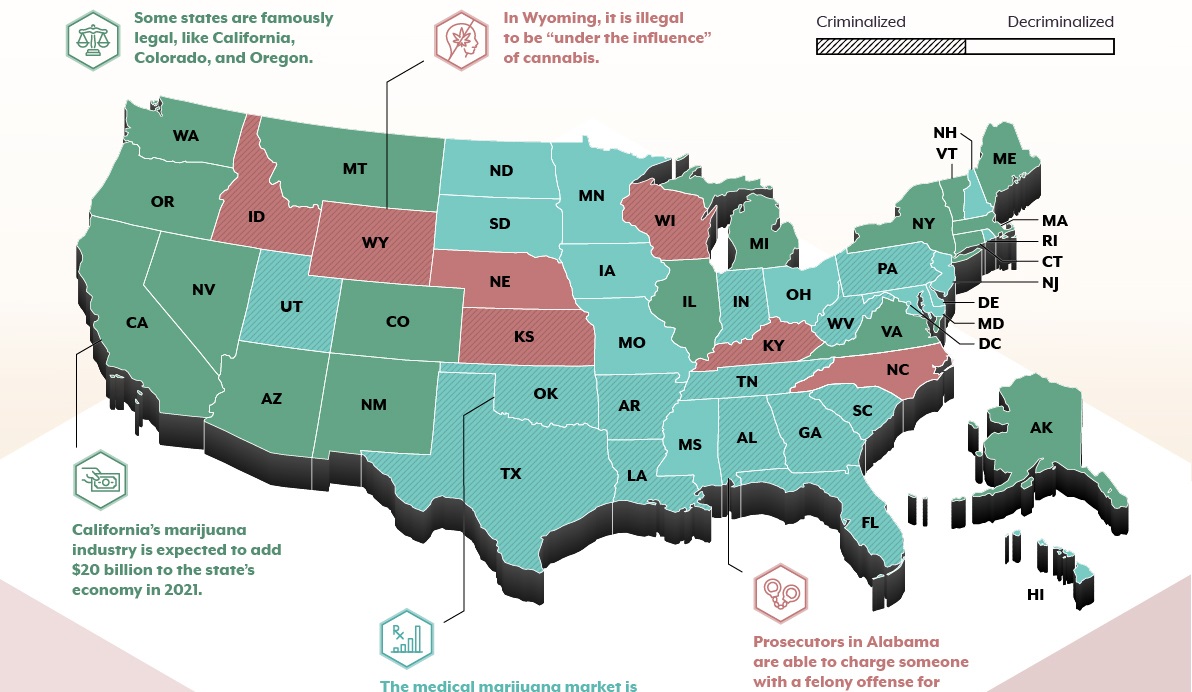President Joe Biden extended a broad pardon for Americans criminally convicted of possessing tiny amounts of marijuana or cannabis, bringing US cannabis policy to the forefront.
Mr. Biden also urged governors to follow suit on state offences and called for a reconsideration of whether cannabis should be classified as a less severe substance.
Cannabis is currently classified as a Schedule I controlled substance under federal law, which means it has “no currently accepted medicinal value and a significant potential for misuse.”
That’s “the same schedule as heroin and LSD, and it’s even higher than the categorization for fentanyl and methamphetamine – the narcotics fueling [America’s] overdose epidemic,” according to one White House official.
“It makes no sense,” Mr Biden said on Thursday, directing his attorney general and health secretary to conduct an investigation.
“Too many lives have been ruined as a result of our disastrous marijuana policy. It is past time to remedy these wrongs.”
Many people were surprised by the news, but it has put cannabis stocks on fire. Advocates say the decision is a necessary first step in bringing a $33 billion (£30 billion) sector out of the shadows and providing relief to those affected by the “war on drugs” that began in the 1970s.
As the White House has pointed out, Mr. Biden’s pardons are confined to “simple possession.” Only roughly 6,500 people with federal offences and some residents of the District of Columbia (DC) are eligible for the relief.
That’s because, despite the fact that roughly 29 million Americans have been detained for cannabis-related offences since 1965, no one is now imprisoned just for possession. Furthermore, most possession convictions are at the state and local levels, and presidential pardons only apply to federal offences.
Organizations like hers are urging the president to de-schedule the drug, that is, to remove cannabis from the 1970 Controlled Substances Act and regulate it similarly to alcohol or tobacco.
“Without de-scheduling, people will continue to face criminal charges and be denied federal benefits; marijuana research will face obstacles; veterans will be unable to access medical cannabis programmes; federal employees can still be fired for using cannabis; entrepreneurs and businesses will be unable to access funding; and banks will remain hesitant to offer loans,” said Ms Frederique, executive director of the Drug Policy Alliance non-profit.
If the Biden-initiated inquiry concludes that cannabis should be reclassified, the federal government will be lagging behind measures currently underway in numerous US states.
Currently, 37 states and the District of Columbia have legalised medical cannabis, while 19 have allowed the drug for recreational use. That is more than 40% of the US population.

Voters in five other states – Arkansas, Maryland, Missouri, North Dakota, and South Dakota – will decide whether to legalise recreational cannabis use next month, with at least four more ballot referendums scheduled for 2024 and 2024.
It reflects how drastically the politics of cannabis legalisation have shifted in such a short period of time.
According to a Gallup study conducted last year, a record 68% of Americans now favour legalising marijuana.
Remarks from Biden Draws Support
While Democrats and independents are significantly more likely to support relaxing cannabis laws, the poll finds that around half of Republicans are also on board.
In response to Mr. Biden’s remarks on Thursday, South Carolina Republican Congresswoman Nancy Mace said “credit where credit is due.”
“I don’t always agree with the Biden administration, and I’ve been fairly public about that,” Ms Mace told Fox Business Network.
In reality, Mr. Biden’s actions reflect a 180-degree turn in his legislative career. He claims to have never used cannabis and, during his 35-year time in the US Senate, wrote and supported numerous anti-drug laws.
According to industry analysts, the president and his party will gain from widespread plaudits for his Thursday announcement in the upcoming midterm elections, which threaten Democrats’ control of Congress.
“Moving to remove the federal marijuana prohibition isn’t only smart policy. It’s smart politics “According to Paul Armentano, deputy director of the National Organization for the Reform of Marijuana Laws (NORML) campaign group.
He contended that by addressing the problem from the podium, the president is “legitimising a subject that has been perceived politically as a fringe issue.”
However, only Congress, not the president, has the authority to change or eliminate cannabis prohibition unilaterally.
Bills to de-schedule cannabis and alleviate financial requirements on marijuana shops were passed in the US House of Representatives this year, but none of these initiatives moved in the Senate. Despite Senate Majority Leader Chuck Schumer’s strong support for certain reforms, he has been unable to bring bills to the floor due to a lack of support.












